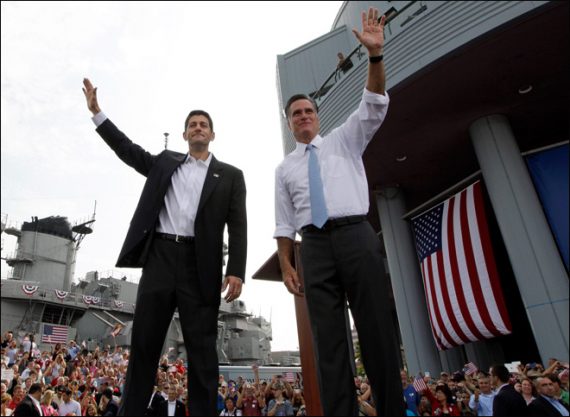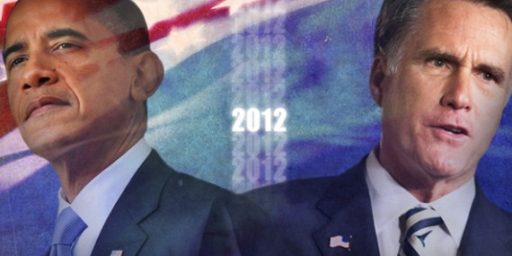House Members Rarely Become Vice-President
The Romney/Ryan ticket is running up a bit of history:
In picking a House Member as his running mate, Mitt Romney hopes to buck more than 80 years of history.
It has been that long since a Member was elected vice president directly from the House – and back then the Member in question was Speaker. In the decades since, only two have been nominated by major parties.
Walter Mondale tapped Rep. Geraldine Ferraro (D-N.Y.) in 1984, a selection that rightfully gained more attention for putting the first female on a major party ticket than for drawing from Congress. Before that, Barry Goldwater selected Rep. William Miller, a largely anonymous New York Republican, in 1964.
(…)
Many vice presidential picks served in the House at an earlier point in their careers, but they generally went on to have other government roles, often in the Senate or the Cabinet, before joining the national ticket.
“Sitting members of the House of Representatives are almost never selected as running mates, in part because they are perceived to have a stature deficit relative to senators, governors or members of the executive branch,” Goldstein wrote.
Gerald Ford was the last man to move directly from the House to the vice presidency, but Ford – the House Minority Leader – was appointed by President Richard Nixon to fill the vacancy created by the resignation of Spiro Agnew.
The last elected vice president from the House came a few decades before Ford’s appointment.
Known as “Cactus Jack,” John Nance Garner was put on the ticket with Franklin Roosevelt in 1932. Garner, a Texas Democrat, served in the House for 30 years, rising to the role of Speaker when Democrats took the majority in 1931.
Before Garner, the only other person to go directly from the House to the Vice-Presidency in the 20th Century was James Sherman, who served as Theodore Roosevelt’s Vice-President in his second term. In the 18th Century, there were 3 sitting House members elected to the Vice-Presidency, Adlai Stevenson (the First), William A. Wheeler, and Schyuler Colfax, Of course, the odds of a House member become Vice-President are still better than the odds of them becoming President. That’s only happened once, when James A. Garfield was elected President in 1880.







Pretty sure no one wants to follow in Garfield’s shoes.
Good. Let’s hope the trend stays on the rare side for this election.
I noted in my initial assessment, governors and senators simply are accorded much more gravitas than mere representatives. Still, it’s a pretty small sample size that we’re dealing with. The odds of getting elected vice president are infinitesimal regardless.
I don’t know which point is more surreal: The laundry list of obvious reasons why you don’t pick a mere congressman for the veep slot, or the fact that GOP veep choices traditionally have been so mind numbingly absurd by comparison Ryan looks good.
@Tsar Nicholas:
Other than Palin and Quayle, what was absurd about Cheney, Jack Kemp, or George H.W. Bush?
Okay, Nixon picking Agnew was absurd when he had such obviously better, and more ethical, talent as Rockefeller, Scranton, and Romney available in 1968, and Goldwater’s VP pick was a seat filler for a ticket that was destined to lose, but Nixon picked Henry Cabot Lodge Jr in 1960 and his resume was nothing to sneeze at.
@James Joyner:
Fair point on the odds.
I think the reason that Members of Congress rarely get picked to be running mates is because they typically lack experience in campaigning outside their districts. That’s true of Ryan too, and we don’t know how he’ll adjust to life on a national campaign trail.
He’s especially bucking history as his two actual achievements of his 13 years are getting a post office renamed and getting arrows (yes, from bow and arrows) exempted from taxes. He isn’t Sarah Palin, but I think that the Republican decision to factor style over substance again is going to get them again.
As Derrick points out, Representative accomplishment tend to be local. However, Ryan moved into the national leagues when he put for his budget plan. To forego the chatter, let’s stipulate the Left see this budget plan as an advantage to their hopes and dreams. The Right sees it as an advantage for themselves.
In any case, while mostly unknown, he has a record of thinking nationally. He has a record of dealing with the President and others as equals. So he isn’t quite some unknown Congressman. He has the chops to spar on the national campaign trail. In a few weeks, this will be confirmed or refuted.
So even though history isn’t on his side, that may simply mean the election can be all the more historic.
Wasn’t James K. Polk Speaker of the House before he became President? Therefore he was also a member of the House before he was President, not just Garfield.